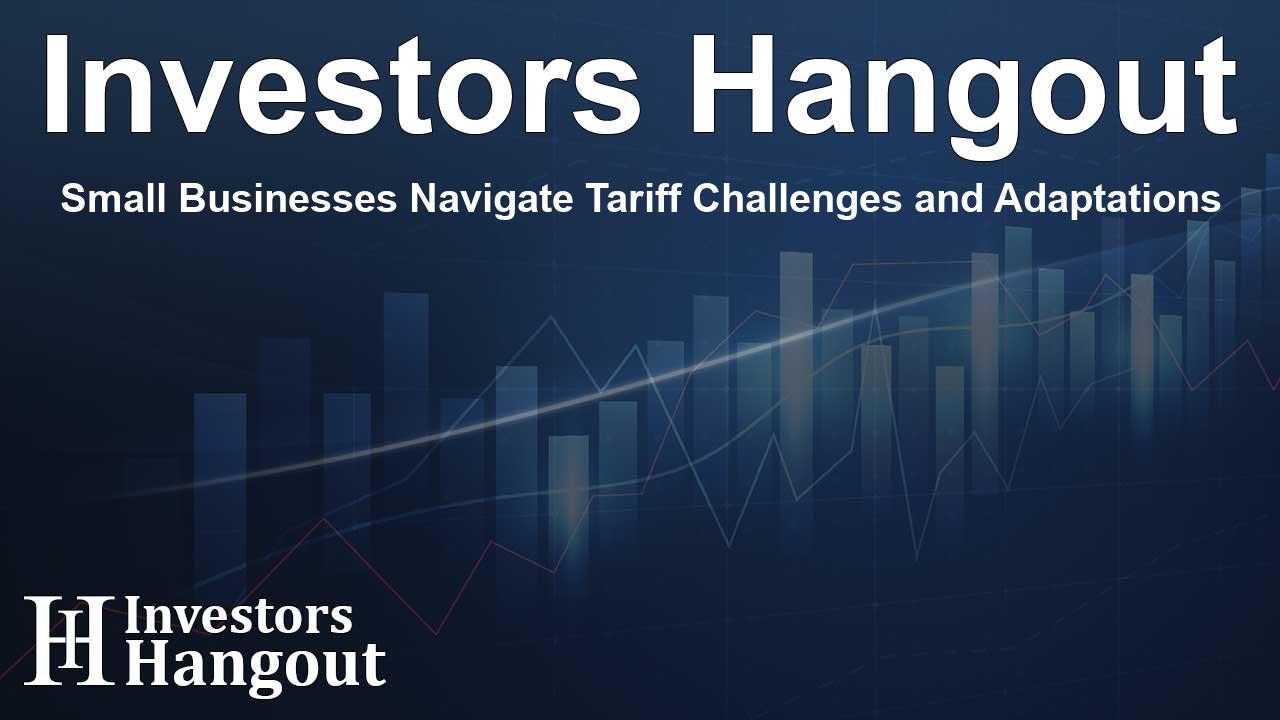Small Businesses Navigate Tariff Challenges and Adaptations

Understanding the Impact of Tariffs on Small Businesses
As discussions around tariffs intensify, the effects on small businesses become increasingly evident. Small business owners (SBOs) are feeling the pressure of rising costs and the complexities of navigating trade policies. A recent survey reveals that many SBOs are quietly adapting to these challenges, albeit with little confidence in government strategies.
Rising Costs and Supply Chain Disruptions
Small businesses are experiencing practical challenges due to tariffs. These include heightened costs for products and materials along with disruptions in their supply chains. Recent findings indicate that approximately 42% of SBOs acknowledge that current tariff policies negatively affect their operations. A staggering 41% cite increased product costs, while 24% face supply chain delays that complicate their day-to-day functioning.
Quiet Adjustments in Response to Tariffs
In response to the tariffs, nearly half of all surveyed SBOs—47%—have either made adjustments or plan to. Among these businesses, 58% have raised their prices. Others are reconsidering their sourcing strategies or postponing investments, with many absorbing the costs rather than passing them onto consumers. This adaptability highlights their resilience in the face of economic pressures.
Temporary Relief: Absorbing Costs and Its Limits
While some small business leaders attempt to absorb the costs associated with tariffs, only 18% report that they fully pass these expenses on to customers. A notable 29% are not transferring any of the additional financial burdens to their clients. However, this approach is not sustainable; more than half—51%—of SBOs anticipate they can only absorb these costs for a limited time, specifically 12 months or less.
Confidence in Trade Policy: A Divided Perspective
The sentiment regarding trade policies is quite concerning among small businesses. Only 26% of SBOs express confidence in the government's management of trade issues. This lack of trust manifests politically: while 52% of Democrats have low confidence in trade policy, only 14% of Republicans share that view. This division reflects broader national sentiment regarding economic priorities.
Concerns Over Competitive Disadvantages
Tariffs elicit varied opinions among SBOs. While 35% feel that tariffs place them at a disadvantage, 21% have the opposite belief and view them as beneficial to their positioning. Looking forward, about 36% anticipate tariffs negatively impacting their businesses in the coming year, while 23% are optimistic about potential advantages.
Future Concerns and Market Conditions
When asked to identify their chief concerns regarding tariffs and trade policy, the majority of small business leaders expressed alarm over rising material costs (51%). They also worry about policy unpredictability (39%), long-term competitiveness (31%), and strained access to global supplies (25%). These factors underscore the precarious nature of small business survival in today’s fluctuating market.
A Split Opinion on Tariffs
Small business owners are divided on tariffs. According to the same survey, 35% oppose tariffs, while only 21% support them. The remaining respondents are either neutral or uncertain about their stance. This division illustrates the complexity of the impact tariffs have across different sectors and regions.
About the Survey
This survey, conducted by a leading market research firm, sampled 1,000 U.S. adults aged 18 and older. The poll offers insight into the pressures faced by small businesses due to tariffs and captures the broader implications for the economic landscape.
Frequently Asked Questions
What did the survey reveal about small businesses and tariffs?
The survey indicated that many small businesses are struggling with rising costs due to tariffs, leading to adjustments in pricing and operations.
How have small businesses adapted to the challenges of tariffs?
Small businesses have responded by raising prices, altering sourcing strategies, and sometimes absorbing additional costs themselves.
What are the main concerns of small business owners regarding tariffs?
The most significant concerns are rising material costs, policy unpredictability, and maintaining long-term competitiveness.
How confident are small business owners in trade policies?
Only 26% of SBOs express high confidence in the government’s handling of trade policies, indicating widespread skepticism.
Are small business owners united on their views about tariffs?
No, small business owners are divided; many oppose the tariffs while others believe they can provide a competitive edge.
About The Author
Contact Ryan Hughes privately here. Or send an email with ATTN: Ryan Hughes as the subject to contact@investorshangout.com.
About Investors Hangout
Investors Hangout is a leading online stock forum for financial discussion and learning, offering a wide range of free tools and resources. It draws in traders of all levels, who exchange market knowledge, investigate trading tactics, and keep an eye on industry developments in real time. Featuring financial articles, stock message boards, quotes, charts, company profiles, and live news updates. Through cooperative learning and a wealth of informational resources, it helps users from novices creating their first portfolios to experts honing their techniques. Join Investors Hangout today: https://investorshangout.com/
The content of this article is based on factual, publicly available information and does not represent legal, financial, or investment advice. Investors Hangout does not offer financial advice, and the author is not a licensed financial advisor. Consult a qualified advisor before making any financial or investment decisions based on this article. This article should not be considered advice to purchase, sell, or hold any securities or other investments. If any of the material provided here is inaccurate, please contact us for corrections.
